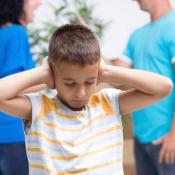 People have their own unique style when it comes to parenting. It is not just about a set of rules; the style of parenting caregivers take on is a reflection of who they are, their culture, and their value systems.
People have their own unique style when it comes to parenting. It is not just about a set of rules; the style of parenting caregivers take on is a reflection of who they are, their culture, and their value systems.
It’s important that parents be able to adapt their parenting style to integrate the best practices of other styles. This article will focus on two styles in particular: authoritarian and authoritative.
Authoritarian Parenting Style
Using an authoritarian parenting style hinders children’s capacity to verbalize what they want and need within the family system and hinders communication between parents and children about the reason for certain rules and expectations. When parents implement an authoritarian parenting style, the family is operating under what I would call a “closed system,” meaning that there is no room for discussion, options, alternatives, or negotiation between parents and their children. Parents who use an authoritarian parenting style send the message that children must cooperate with their parents “because I said so” by implementing techniques such as shaming, withdrawal of love, or arbitrary punishments.
An authoritarian parenting style may get children to be compliant on a short-term basis. However, children will not feel that there is a “democracy” in the household. As a result, they may be compliant due to fear of being punished. In addition, children will perceive that their feelings don’t count, which encourages them to feel powerless.
An authoritarian parenting style creates an oppressive environment for children to live in (particularly for children who are adopted and/or in foster care). An oppressive environment prevents children from thriving. In order for children to thrive, parents need to create an environment that is based on warmth, which allows children to learn to self-regulate.
Children also need to learn self-discipline, and they learn this from internalizing limits from a loving perspective as opposed to having limitations placed on them without empathy.
An authoritarian parenting style can create insecure attachment patterns in children, which prevents the emotional bond necessary that creates trust between parents and children that their physical and emotional needs will be met. As a result, children are more vulnerable to low self-esteem, depression, and anxiety, which are among the most common mental health issues among adolescents.
Parents who choose an authoritarian parenting style most likely were not securely attached as children themselves, which increases the chances of passing on insecure attachment patterns to children.
Authoritative Parenting Style
Of the four primary and widely acknowledged parenting styles, research shows that an authoritative parenting style achieves the most positive results with children. (Permissive and uninvolved are the other two styles.)
An authoritative parenting style responds to the emotional needs of children while setting limits and boundaries. Research on parenting styles shows that when parents are authoritative and engaged, children thrive in their environment and develop secure attachments with parents, an emotional bond that allows children to trust that their physical and emotional needs will be met.
Children feel a sense of empowerment when there is balance between choice and responsibility. Authoritative parents expect their children to meet high standards while also being willing to reason and be flexible with children when they make mistakes. Authoritative parents allow children to have a voice in what happens in their lives, and children perceive that their parents are open and sensitive to their needs. As a result, children have the opportunity to learn how to negotiate, become self-reliant, achieve academic success, develop self-discipline, be socially accepted, and have increased self-esteem.
If children are not provided with these opportunities, they build resentment and act out their feelings, which may cause behavior problems and increases the odds of delinquency and drug use during adolescence.
To implement an authoritative parenting style, parents should:
- Show their children that they care.
- Praise positive behavior and accomplishments.
- Set clear and fair expectations.
- Listen to their children.
- Be consistent.
- Discipline using choices and consequences.
- Take their children’s opinions into consideration.
- Be demonstrative in showing affection and saying, “I love you.”
- Provide opportunities for children to make choices.
For most adults, parenting is one of the most challenging tasks they will take on in life. It can also be one of the most rewarding experiences in life. All parents want their children to grow into happy and well-functioning adults. In order to achieve the best possible outcome, parents should integrate acceptance, firmness, and encouragement of autonomy into their parenting practices.

The preceding article was solely written by the author named above. Any views and opinions expressed are not necessarily shared by GoodTherapy.org. Questions or concerns about the preceding article can be directed to the author or posted as a comment below.

 How Can Parents Lessen Traumatic Effects of Divorce on Children?
How Can Parents Lessen Traumatic Effects of Divorce on Children?
 Lost for Words: Supporting a Parent after the Loss of a Child
Lost for Words: Supporting a Parent after the Loss of a Child

Please fill out all required fields to submit your message.
Invalid Email Address.
Please confirm that you are human.
Leave a Comment
By commenting you acknowledge acceptance of GoodTherapy.org's Terms and Conditions of Use.